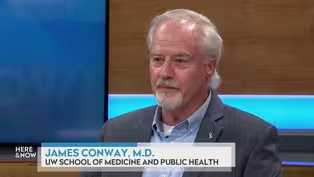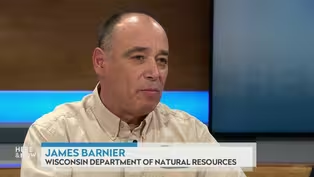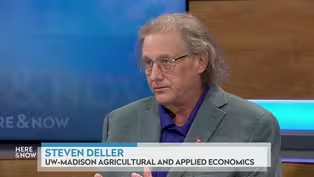Here and Now
Why Complex Health Benefits Are a Focus of Patient Advocates
Clip: Season 2400 Episode 2405 | 10m 30sVideo has Closed Captions
Patient advocates work to navigate complex health plans to find opportunity and options.
Rx Uncovered: Medications for chronic illnesses can be expensive and require special approval — patient advocates work to navigate complicated and opaque health plans to find opportunity and options
Problems playing video? | Closed Captioning Feedback
Problems playing video? | Closed Captioning Feedback
Here and Now is a local public television program presented by PBS Wisconsin
Here and Now
Why Complex Health Benefits Are a Focus of Patient Advocates
Clip: Season 2400 Episode 2405 | 10m 30sVideo has Closed Captions
Rx Uncovered: Medications for chronic illnesses can be expensive and require special approval — patient advocates work to navigate complicated and opaque health plans to find opportunity and options
Problems playing video? | Closed Captioning Feedback
How to Watch Here and Now
Here and Now is available to stream on pbs.org and the free PBS App, available on iPhone, Apple TV, Android TV, Android smartphones, Amazon Fire TV, Amazon Fire Tablet, Roku, Samsung Smart TV, and Vizio.
Providing Support for PBS.org
Learn Moreabout PBS online sponsorship>> All right.
Well, Doctor James Conway, thanks very much.
>> Thanks for having me.
>> On health care.
We continue our coverage on prescription drugs.
Over the last month, Rx Uncovered has looked at why patient costs for drugs are going up and coverage for drugs is going down.
In our final story, patients are not alone as they try to afford their specialty drugs and navigate complex health insurance policies.
Here and now, producer Marissa Wojcik speaks with advocates helping patients understand their health plans and challenge claim denials.
>> How far are they away from bankruptcy?
>> They pretty much billed me $83,000 per infusion.
>> They are as far away as a chronic diagnosis.
>> The right medication can be expensive, but critical for chronic illness patients.
Advocates like Nilsa Cruz know this all too well.
>> The reason why I became a patient advocate is it was actually baptism by fire.
>> When she started as administrator for the Milwaukee Rheumatology Center, more than 20 years ago, she also became the clinic's de facto patient advocate.
>> Patients coming back or calling back because their medication is not covered, perhaps they cannot afford the out-of-pocket expense.
After going through a very tedious process of a prior authorization, only to come and find out that it's unaffordable, delays and denials.
Some patients suffering, too.
Because the patients really don't understand what's going on with their benefits.
>> Today, she's known and even sought out for her ability to help patients navigate complex health benefits.
>> I come to this clinic because of their patient advocate.
>> Janelle Zeihen came to Cruz when her last clinic didn't know how to help her navigate her health plan benefits.
So she came to this rheumatology clinic for her Crohn's, a type of inflammatory bowel disease.
>> It starts with like a like somebody sucker punching me right up into my chest.
And then.
And that's pretty much the inflammation starting.
>> Crohn's disease can be debilitating and life threatening, especially when not treated.
>> It is extremely painful.
I can barely walk when it happens.
Being on the entyvio that I get, it's been life changing.
>> When she got a new job, her entyvio was no longer covered under her new plan.
>> They specifically carved out all tier four drugs, which are chemo's HIV drugs and any infusions.
>> Tier four drugs are also referred to as specialty drugs.
>> When you have a complex condition, what you get slapped with is this penalty called specialty drug because a pharmacist might have to monitor or look at something more closely, which they should be doing for every drug anyway.
>> Ann Lewandowski also knows how difficult but essential it is finding the right medication.
>> Accessing it because of insurance barriers and other issues can also be as much or more challenging.
>> She has her own experience with autoimmune disorders and healthcare.
>> You're really in survival mode and you're just trying to figure out, like, do I go to work and make money?
Or do I deal with this disease?
>> Part of her expertise.
>> I am also a patient.
>> Comes from being a patient, and she uses that knowledge to help others better understand these complex systems.
>> We have these market distortions, right?
We have, depending on what your diagnosis is, who your insurance company is to patients walking in with even the same diagnosis are going to be charged completely different prices.
And I think that's really problematic.
>> I've seen plan documents where they're limiting, you know, drug expenditure, like anything over 100,000 is out.
I've seen plan documents where cancer drugs are not covered, where none of none of the rheumatology drugs are covered.
>> Often patients that can't afford an expensive drug qualify for patient assistance programs through the pharmaceutical company.
But these programs are usually for people with little to no health coverage.
>> I am insured at $400 premium cost.
>> Janelle was covered by her employer's self-funded health plan, even though it's specifically carved out her medication, leaving her to cover the cost.
>> Big time pharma is starting to say no, it's not happening.
Companies are saying these funds are patients who are literally uninsured.
Pharma will deny that free drug for the patient because benefits have been carved out and made non-essential by the plan.
And you're literally functionally uninsured.
>> Having coverage, at least on paper, disqualified her for patient financial assistance.
Why some drugs are covered by some health plans and not others is an opaque and complex system.
>> The pricing structure in this country when it comes to pricing these drugs and reimbursement, and what actual costs are, is so messed up.
It's so messed up.
>> These carve outs to not cover expensive drugs are becoming more common among self-funded health plans like Janelle's, which are governed by different laws than fully insured health plans.
>> We know health insurance can be complicated and confusing.
>> Secretary Nathan Houdek oversees the office of the Commissioner of Insurance.
>> And what makes it even more confusing for people is that health insurance is really regulated by a number of different agencies at both the federal and state levels.
>> This state agency regulates fully insured health plans.
If a patient wants to challenge an insurance denial, they come here.
don't understand if they have employer sponsored coverage is whether that's fully insured coverage or whether that is self-funded coverage.
>> Self-funded coverage is regulated by federal law, but you can still start with this office.
>> If someone has health insurance coverage through a self-funded plan, then we will kind of hand them off to we like to refer to as kind of a warm handoff to the Department of Labor, because it's the federal Department of Labor that actually regulates self-funded plans.
>> Because of this, no matter what kind of plan, Secretary Houdek recommends reaching out.
>> Unfortunately, studies have shown that of all the coverage and claim denials, only a small percentage are appealed.
And that's really because people don't know what their rights are.
People don't know that there is a place where they can turn to answer questions, to be a resource, and our office is here to help with that.
>> Fully insured versus self-funded plans.
Health experts say they both have their own issues.
The rules are just different.
>> I have a lot of empathy for employers, right?
I mean, if you are a manufacturer here in Wisconsin.
You're making cheese.
You're making steel parts, whatever.
Making yachts.
It really doesn't matter.
You are not a health care expert.
>> For Janelle, her case was even more complicated than most.
But Cruz was with her every step of the way.
>> First of the year go through.
conversation, Janelle, you literally told me I'm just settle on not getting my treatment this year.
>> She helped Janelle file a complaint with the US Department of Labor.
>> Please keep in mind that for any given patient to file a complaint with the Department of Labor takes guts because you're now dealing with filing a complaint against your employer.
And the fear of getting fired, even though it's totally illegal.
>> It does make it hard to go into work, because I also don't know if I'm going to be walking into work and being walked out because of this.
And for retaliation or whatnot.
>> There are still these very gray questions of law that honestly make me a little scared to be a patient and speak up and encourage people to exercise their legal rights, which are to speak to their employer and say, hey, this is a wrong denial.
>> During open enrollment, Janelle decided not to use her employer's health plan, opting to find a fully insured one on the marketplace.
my employer, I would be right back to where I would start and that would be just that's not even an option.
>> She pays more in premiums, but her medication is covered without the help of advocates.
Many patients are left deciding between their medication or their savings.
>> Can patients do this themselves?
Probably not, because the statistics have shown that very few patients will take it to the next level.
It's too cumbersome.
If you look at denial letters, the steps are in there and it's Yvonne cumbersome for me.
However, having said that, I'm constantly looking for ways to make it easier for my patients to appeal.
>> For her patients.
Cruz goes all in to help them find relief.
>> Thanks for everything.
>> Relief from the physical pain of a chronic illness and relief from the financial pain of treating it.
Reporting from it.
Reporting from
Dr. James Conway On Wisconsin's Risks of Measles Outbreaks
Video has Closed Captions
Clip: S2400 Ep2405 | 5m 2s | Dr. James Conway on a measles outbreak in Oconto County and a low state vaccination rate. (5m 2s)
Here & Now opening for August 8, 2025
Video has Closed Captions
Clip: S2400 Ep2405 | 56s | The introduction to the August 8, 2025 episode of Here & Now. (56s)
James Barnier On The Potential for Wildfire Around Wisconsin
Video has Closed Captions
Clip: S2400 Ep2405 | 4m 34s | James Barnier on risks of large and widespread wildfires as federal funding is cut. (4m 34s)
Steven Deller On Tariffs, Job Numbers and Economic Trends
Video has Closed Captions
Clip: S2400 Ep2405 | 4m 56s | Steven Deller on what new tariffs, jobs and spending figures mean for the economy. (4m 56s)
Providing Support for PBS.org
Learn Moreabout PBS online sponsorship
- News and Public Affairs

Top journalists deliver compelling original analysis of the hour's headlines.

- News and Public Affairs

FRONTLINE is investigative journalism that questions, explains and changes our world.












Support for PBS provided by:
Here and Now is a local public television program presented by PBS Wisconsin



